During their Lenten Journey the students who attend the Catholic Schools of the Diocese of Venice are being reminded to take seriously the call for prayer, fasting and almsgiving while not forgetting the ashes they received on Ash Wednesday.
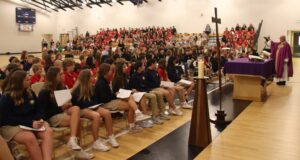
Bishop Frank J. Dewane celebrated the first in a series of Masses for students in all Diocesan Catholic schools on March 2, 2023, for St. Martha Catholic School and St. Mary Academy in Sarasota. This was followed on March 3, with a Mass for students at St. Charles Borromeo Catholic School in Port Charlotte. Additional Masses are scheduled throughout March.
Bishop Dewane said the ashes the students received on Ash Wednesday may have faded or been washed away but the mark is still there.
“It is a reminder of the journey we are all on during this Lenten Season, and how we are to live a righteous life – a good life – according to the way the Lord taught,” the Bishop said. “It is about how do you treat others, day in and day out. Do it with a goodness, righteousness and with mercy in your hearts. Know that the way you were signed with a cross in ashes must stay with you throughout this Lenten Season. This is a sign of goodness grown out the Lord’s sacrifice.”
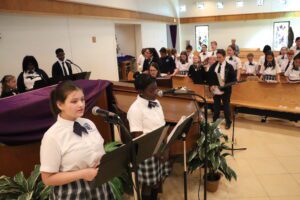
In addition, Bishop Dewane reminded the students how the three pillars of Lent – prayer, fasting and almsgiving – are not exclusive for parents and other adults to act upon and consider. These pillars are a guidepost for everyone to follow in his or her own way, from the youngest child to the oldest grandparent.
“Prayer, for example, should not be confined to school. Find time at home, before meals, or at bedtime, or when you get up,” the Bishop continued. “In that way you are growing in your relationship with the Lord.”
While fasting for many might mean going without food, there are plenty of options for younger students to make a true sacrifice for God. Giving up a favorite television show, video game, a favorite candy, or even all candy, is taking a step in the right direction, but it must be a true sacrifice to achieve a greater closeness with Christ.
Almsgiving is traditionally associated with giving money, but Bishop Dewane explained that the students can use this discipline as an opportunity to do good things for others.
“Helping or doing for others – be it a brother or sister, a parent, or a friend – being a good person is about giving a part of oneself for the other, doing what is right in the eyes of Jesus.”
The Lenten Season, Bishop Dewane said, is about responding to the call of Christ with goodness, righteousness, and justice in our hearts.
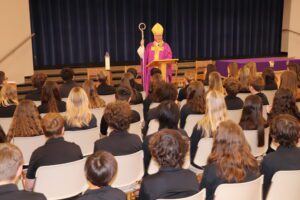
Following the Masses, the Bishop spoke with the eighth graders during which he inquired how they were progressing in school and encouraged them to remain the leaders of their respective school and to seriously consider attending a Diocesan Catholic High School next year, with many saying they would.
The eighth graders were then allowed to question the Bishop on any topic. Some questions focused on the unique clothing he wears during Mass, while others centered on learning about his personal spiritual journey to the priesthood and ultimately a Bishop. Bishop Dewane explained how his first internal call to the priesthood started about when he was in eighth grade. From that point he put off that call to focus on school, university and then work in the business world. Finally, he decided he needed to follow the call of the Lord and has never looked back. “It felt right.”






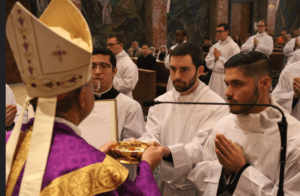 Diocese of Venice Seminarian, Joseph Corboy Doherty was one of 19 seminarians to enter into the Ministry of Acolyte on March 5, 2023, in the Chapel of the Immaculate Conception at the Pontifical North American College, Vatican City State. Archbishop Shelton J. Fabre of Louisville was the main celebrant and spoke the following words as he handed the paten to each candidate: “Take this vessel with bread for the celebration of the Eucharist. Make your life worthy of your service at the table of the Lord and of his Church.” In his homily, Archbishop Fabre encouraged the seminarians, saying, “The ministry of an acolyte has a special connection to the altar and to the Eucharist. It is the duty of the acolyte to assist in serving the altar during liturgical celebrations and to attend to the Eucharist in certain functions and capacities. This is certainly an important ministry since it involves service to some of the most important elements of our Catholic faith, if not the most central element.” Representing the Diocese of Venice were Father Christian Chami and Transitional Deacon Daniel Scanlan.
Diocese of Venice Seminarian, Joseph Corboy Doherty was one of 19 seminarians to enter into the Ministry of Acolyte on March 5, 2023, in the Chapel of the Immaculate Conception at the Pontifical North American College, Vatican City State. Archbishop Shelton J. Fabre of Louisville was the main celebrant and spoke the following words as he handed the paten to each candidate: “Take this vessel with bread for the celebration of the Eucharist. Make your life worthy of your service at the table of the Lord and of his Church.” In his homily, Archbishop Fabre encouraged the seminarians, saying, “The ministry of an acolyte has a special connection to the altar and to the Eucharist. It is the duty of the acolyte to assist in serving the altar during liturgical celebrations and to attend to the Eucharist in certain functions and capacities. This is certainly an important ministry since it involves service to some of the most important elements of our Catholic faith, if not the most central element.” Representing the Diocese of Venice were Father Christian Chami and Transitional Deacon Daniel Scanlan.
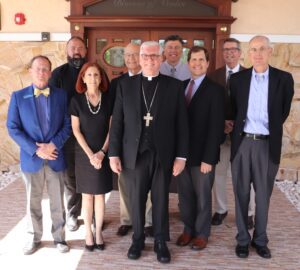
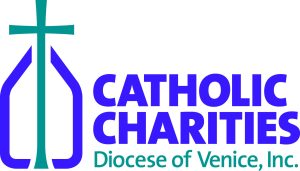 Catholic Charities Diocese of Venice, Inc. in Arcadia is seeking help in giving the gift of an Easter Basket for children of Casa San Juan Bosco farmworkers housing, local families, and migrant farm workers. Supporters can donate Easter Basket supplies, gift cards, or check to help the program bless children this Easter! Drop off or deliver items ordered online to Catholic Charities, 1210 East Oak St., Arcadia, FL 34266, by April 5.
Catholic Charities Diocese of Venice, Inc. in Arcadia is seeking help in giving the gift of an Easter Basket for children of Casa San Juan Bosco farmworkers housing, local families, and migrant farm workers. Supporters can donate Easter Basket supplies, gift cards, or check to help the program bless children this Easter! Drop off or deliver items ordered online to Catholic Charities, 1210 East Oak St., Arcadia, FL 34266, by April 5.
 Claire Sattler, a Bishop Verot Catholic High School 2019 graduate, recently joined 27 former teen Jeopardy! contestants as they faced off in the Jeopardy! High School Reunion Tournament. The players competed for a $100,000 grand prize and a spot in the next Tournament of Champions. Sattler, now a senior at Yale University, won the 2018 Teen Tournament of Champions. In the opening quarterfinal round, which aired Feb. 27, 2023, Sattler was able to secure her win in the Final Jeopardy round because of a research paper topic that was given to her by her freshman English teacher – Lynn Chervenok Knox. In honor of her former teacher, Sattler drew a smiley face next to the winning question and wrote, “Thanks, Mrs. Knox!” With her victory, the native of Bonita Springs next appeared in the semifinals on March 6. Sattler, who had been in the lead with $8,600 going into Final Jeopardy. All three contestants failed to get the correct solution, so when Sattler bet $8,201, and dropped to $399, she ended up in third place. Well done as she continues to proudly represent Bishop Verot.
Claire Sattler, a Bishop Verot Catholic High School 2019 graduate, recently joined 27 former teen Jeopardy! contestants as they faced off in the Jeopardy! High School Reunion Tournament. The players competed for a $100,000 grand prize and a spot in the next Tournament of Champions. Sattler, now a senior at Yale University, won the 2018 Teen Tournament of Champions. In the opening quarterfinal round, which aired Feb. 27, 2023, Sattler was able to secure her win in the Final Jeopardy round because of a research paper topic that was given to her by her freshman English teacher – Lynn Chervenok Knox. In honor of her former teacher, Sattler drew a smiley face next to the winning question and wrote, “Thanks, Mrs. Knox!” With her victory, the native of Bonita Springs next appeared in the semifinals on March 6. Sattler, who had been in the lead with $8,600 going into Final Jeopardy. All three contestants failed to get the correct solution, so when Sattler bet $8,201, and dropped to $399, she ended up in third place. Well done as she continues to proudly represent Bishop Verot.
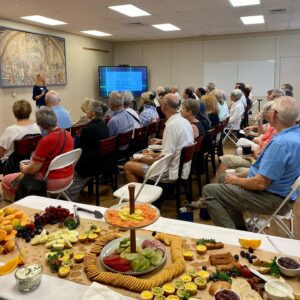
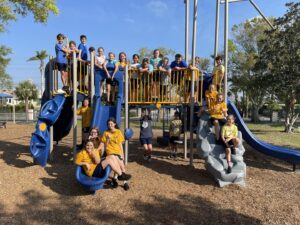

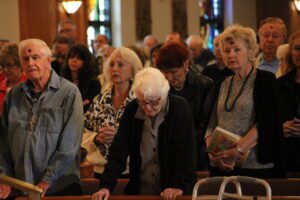
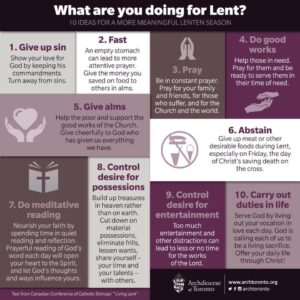 The second Lenten discipline is prayer. All Catholics are called to a prayer life that is both diverse and rich. A diverse prayer life includes personal and communal prayer, in which the faithful grow closer to Christ Himself – as well as to the Church Christ founded.
The second Lenten discipline is prayer. All Catholics are called to a prayer life that is both diverse and rich. A diverse prayer life includes personal and communal prayer, in which the faithful grow closer to Christ Himself – as well as to the Church Christ founded.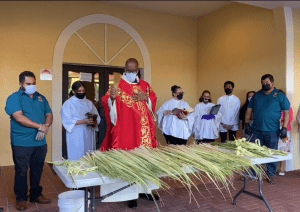 On Palm Sunday, April 10, 2022, the Mass opened with a blessing of the Palms and entrance into the Church, reminiscent of the Lord’s Messianic entrance into Jerusalem.
On Palm Sunday, April 10, 2022, the Mass opened with a blessing of the Palms and entrance into the Church, reminiscent of the Lord’s Messianic entrance into Jerusalem.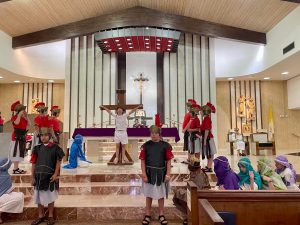 Each Diocesan Catholic school offered a “Living Stations of the Cross,” typically with older students leading the reenactment of the Passion of Our Lord.
Each Diocesan Catholic school offered a “Living Stations of the Cross,” typically with older students leading the reenactment of the Passion of Our Lord.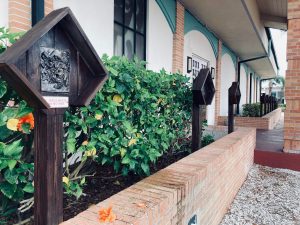 At Sacred Heart Parish in Punta Gorda, the religious education program had their young charges (grades 1-5) participate in an interactive Stations of the Cross. Students were selected to portray key characters bringing the stations “to life,” while Msgr. Phil Hill, an assisting priest, provided the narration and background for each Station. This enabled the children to better understand Jesus’ journey to Calvary. Catechists and parents were on hand to listen to the story leading to Christ’s crucifixion.
At Sacred Heart Parish in Punta Gorda, the religious education program had their young charges (grades 1-5) participate in an interactive Stations of the Cross. Students were selected to portray key characters bringing the stations “to life,” while Msgr. Phil Hill, an assisting priest, provided the narration and background for each Station. This enabled the children to better understand Jesus’ journey to Calvary. Catechists and parents were on hand to listen to the story leading to Christ’s crucifixion.
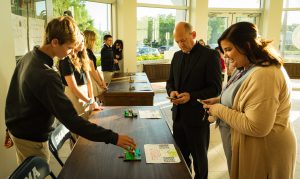
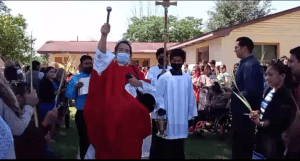 Easter Sunday Televised Mass
Easter Sunday Televised Mass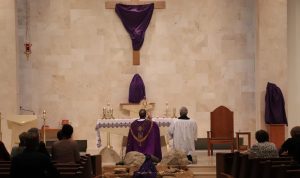 St. Katharine Drexel Parish in Cape Coral hosted a 40-hour Devotion April 2, to April 4, 2022. This devotion included Adoration, the Chaplet of Divine Mercy, praying the Holy Hour and concluded with a Mass. Father Ricky Varner, Pastor at St. Katharine Drexel, stressed the importance of focusing on the Lord through Eucharistic Adoration. The 40-hour Devotion was spilt into blocks of time throughout the three days to allow for more people to participate and benefit from spending prayerful time in the presence of the Lord.
St. Katharine Drexel Parish in Cape Coral hosted a 40-hour Devotion April 2, to April 4, 2022. This devotion included Adoration, the Chaplet of Divine Mercy, praying the Holy Hour and concluded with a Mass. Father Ricky Varner, Pastor at St. Katharine Drexel, stressed the importance of focusing on the Lord through Eucharistic Adoration. The 40-hour Devotion was spilt into blocks of time throughout the three days to allow for more people to participate and benefit from spending prayerful time in the presence of the Lord.
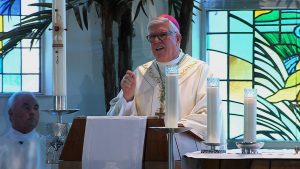
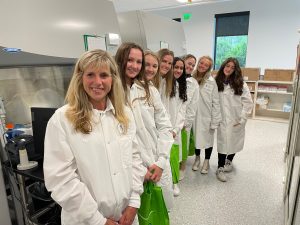 Bishop Verot Catholic High School students in “Medical Interventions,” a third-year course in the Biomedical Sciences program in Fort Myers, visited Neogenomics on April 1, 2022, to better understand the application of the research they are doing in class and learn about potential career paths.
Bishop Verot Catholic High School students in “Medical Interventions,” a third-year course in the Biomedical Sciences program in Fort Myers, visited Neogenomics on April 1, 2022, to better understand the application of the research they are doing in class and learn about potential career paths.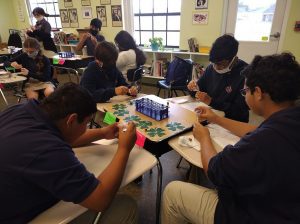 Catholic schools in the Diocese of Venice pride themselves on offering programs in all areas of study including science. Seventh graders at St. Catherine Catholic School in Sebring were studying DNA and genetics on March 30, 2022. As part of the lesson, they extracted their own DNA, using dried skin, and observed it in the school’s STREAM (Science, Technology, Religion, Engineering, Arts and Math) lab. Classes like this enable students to learn more about not only the world around them, but also about themselves: students identify themselves as unique through their DNA and, in particular, as children of God.
Catholic schools in the Diocese of Venice pride themselves on offering programs in all areas of study including science. Seventh graders at St. Catherine Catholic School in Sebring were studying DNA and genetics on March 30, 2022. As part of the lesson, they extracted their own DNA, using dried skin, and observed it in the school’s STREAM (Science, Technology, Religion, Engineering, Arts and Math) lab. Classes like this enable students to learn more about not only the world around them, but also about themselves: students identify themselves as unique through their DNA and, in particular, as children of God. A March 31, 2022, field trip to Florida Gulf Coast University in Estero by fifth graders from St. Francis Xavier Catholic School in Fort Myers helped the young students learn about wildlife that is native to Florida. The program, called the “Panther Posse,” brings in wildlife experts to share images and research that is ongoing about the Florida panther as well as other wildlife, including black bears. The presentation is a mix of fun and hands-on science. Students learned to identify trail markings of different wildlife as well as what dangers the wildlife face from pollution and interaction with people. The students left the program as newly launched naturalists and scientists.
A March 31, 2022, field trip to Florida Gulf Coast University in Estero by fifth graders from St. Francis Xavier Catholic School in Fort Myers helped the young students learn about wildlife that is native to Florida. The program, called the “Panther Posse,” brings in wildlife experts to share images and research that is ongoing about the Florida panther as well as other wildlife, including black bears. The presentation is a mix of fun and hands-on science. Students learned to identify trail markings of different wildlife as well as what dangers the wildlife face from pollution and interaction with people. The students left the program as newly launched naturalists and scientists.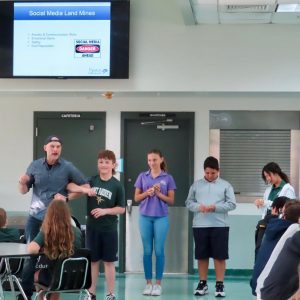 Students at the different schools in Lee County heard from a specialist the week of March 29, 2022, about how to navigate technology and social media in today’s world. Robert Hackenson Jr. of Dynamic Influence spoke with students at St. Andrew Catholic School in Cape Coral, St. Francis Xavier Catholic School in Fort Myers as well as at Bishop Verot Catholic High School in Fort Myers. These lessons provided basic tips on the pitfalls of providing too much information about yourself online. The safety aspects could not be overstated as online predators try to manipulate people of all ages to endanger the users in different ways. Hackenson used age-appropriate examples to ensure the students understood these dangers. One of the focuses was on Social Media Land Mines, which included never revealing your location, details about your home or private life and much more.
Students at the different schools in Lee County heard from a specialist the week of March 29, 2022, about how to navigate technology and social media in today’s world. Robert Hackenson Jr. of Dynamic Influence spoke with students at St. Andrew Catholic School in Cape Coral, St. Francis Xavier Catholic School in Fort Myers as well as at Bishop Verot Catholic High School in Fort Myers. These lessons provided basic tips on the pitfalls of providing too much information about yourself online. The safety aspects could not be overstated as online predators try to manipulate people of all ages to endanger the users in different ways. Hackenson used age-appropriate examples to ensure the students understood these dangers. One of the focuses was on Social Media Land Mines, which included never revealing your location, details about your home or private life and much more.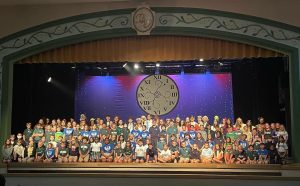 Student groups from St. Andrew Catholic School in Cape Coral and St. Francis Xavier Catholic School in Fort Myers were given a sneak peek of the musical “Cinderella” at Bishop Verot Catholic High School on April 1, 2022. Two special previews were offered for the younger students who saw the elaborate production by the Verot Theater Department. Afterwards, the students were able to meet some of the cast and people who worked behind-the-scenes to make the show happen. Full performances were offered throughout the subsequent weekend.
Student groups from St. Andrew Catholic School in Cape Coral and St. Francis Xavier Catholic School in Fort Myers were given a sneak peek of the musical “Cinderella” at Bishop Verot Catholic High School on April 1, 2022. Two special previews were offered for the younger students who saw the elaborate production by the Verot Theater Department. Afterwards, the students were able to meet some of the cast and people who worked behind-the-scenes to make the show happen. Full performances were offered throughout the subsequent weekend.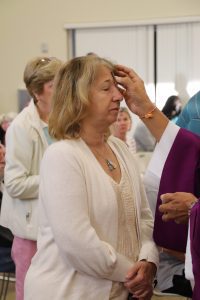 Grand displays are not what the Lord wants, explained Father Robert Tatman, Parochial Vicar of St. Jude Parish in Sarasota. The clear example of this is represented in the ashes marked on one’s forehead to open Lent on Ash Wednesday, March 2, 2022.
Grand displays are not what the Lord wants, explained Father Robert Tatman, Parochial Vicar of St. Jude Parish in Sarasota. The clear example of this is represented in the ashes marked on one’s forehead to open Lent on Ash Wednesday, March 2, 2022. For those not prepared for the collection, donations may be sent to the Diocese of Venice, with “Ukraine” indicated in the memo or note line at the following address: Diocese of Venice in Florida, Ukraine Relief, 1000 Pinebrook Road, Venice, FL 34285.
For those not prepared for the collection, donations may be sent to the Diocese of Venice, with “Ukraine” indicated in the memo or note line at the following address: Diocese of Venice in Florida, Ukraine Relief, 1000 Pinebrook Road, Venice, FL 34285.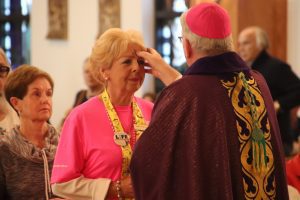 The 40-day Season begins on Ash Wednesday, March 2, 2022, ending at sundown on Holy Thursday, April 14, and is an opportunity for the faithful to undertake the practices of prayer, fasting and almsgiving as a means to know Christ better and follow His will more faithfully.
The 40-day Season begins on Ash Wednesday, March 2, 2022, ending at sundown on Holy Thursday, April 14, and is an opportunity for the faithful to undertake the practices of prayer, fasting and almsgiving as a means to know Christ better and follow His will more faithfully.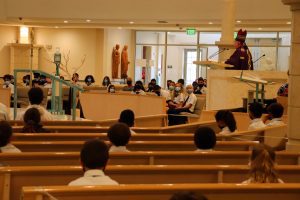 “The challenge is to do what Christ asks,” Bishop Frank J. Dewane told students during a number of Lenten Masses he celebrated at schools throughout the Diocese of Venice in early March. “We need to take seriously our prayers, fasting, and almsgiving, following the example of Christ.”
“The challenge is to do what Christ asks,” Bishop Frank J. Dewane told students during a number of Lenten Masses he celebrated at schools throughout the Diocese of Venice in early March. “We need to take seriously our prayers, fasting, and almsgiving, following the example of Christ.”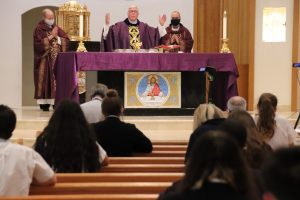 Each Lent, Bishop Dewane takes the time to celebrate Mass at as many Diocesan Catholic schools as possible. The goal is not only to highlight the importance of the Lenten Season, but to also show support for the students and schools as they continue through their academic year.
Each Lent, Bishop Dewane takes the time to celebrate Mass at as many Diocesan Catholic schools as possible. The goal is not only to highlight the importance of the Lenten Season, but to also show support for the students and schools as they continue through their academic year.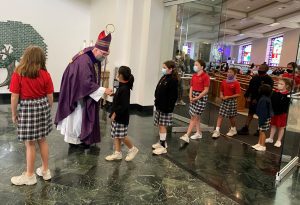
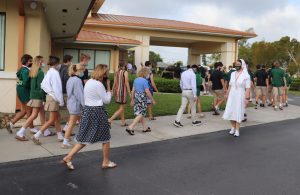 The Bishop celebrated Masses for students at St. John Neumann Catholic High School and St. Ann Catholic School in Naples on March 3, 2021; for St. Elizabeth Seton Catholic School in Naples on March 4; and then for St. Charles Borromeo Catholic School in Port Charlotte on March 5. Additional Masses will take place later in March.
The Bishop celebrated Masses for students at St. John Neumann Catholic High School and St. Ann Catholic School in Naples on March 3, 2021; for St. Elizabeth Seton Catholic School in Naples on March 4; and then for St. Charles Borromeo Catholic School in Port Charlotte on March 5. Additional Masses will take place later in March.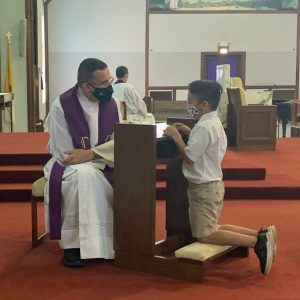

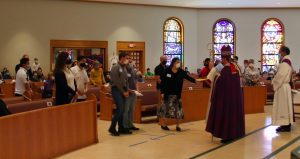 One major step in this journey occurred on Feb. 21, 2021, when the Rite of Election was held on the first Sunday of Lent. This annual tradition is a formal Rite in which catechumens are presented and their names are entered into the Book of Elect. Candidates are also present as part of their calling to continuing conversion.
One major step in this journey occurred on Feb. 21, 2021, when the Rite of Election was held on the first Sunday of Lent. This annual tradition is a formal Rite in which catechumens are presented and their names are entered into the Book of Elect. Candidates are also present as part of their calling to continuing conversion.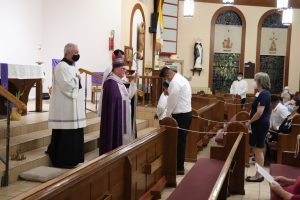 “My prayer is that you are here today because you are convinced in your mind, heart and, most importantly, your soul, that the Catholic Church offers you the fullness of Christianity in a very clear way, and you are content and are willing to live it out in that way,” the Bishop stated.
“My prayer is that you are here today because you are convinced in your mind, heart and, most importantly, your soul, that the Catholic Church offers you the fullness of Christianity in a very clear way, and you are content and are willing to live it out in that way,” the Bishop stated.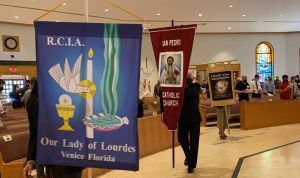 To accommodate social distancing, sponsors did not sit or stand next to their catechumens this year unless they were spouses or members of the same household. During the Act of Admission, sponsors extended a hand toward their catechumen, instead of placing a hand on the catechumen’s shoulder, as in past years.
To accommodate social distancing, sponsors did not sit or stand next to their catechumens this year unless they were spouses or members of the same household. During the Act of Admission, sponsors extended a hand toward their catechumen, instead of placing a hand on the catechumen’s shoulder, as in past years.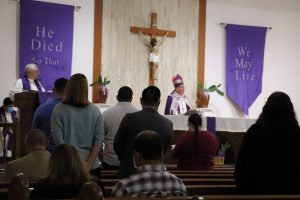 After completing the Rite of Election, the catechumens continue their spiritual formation throughout the remainder of Lent, a period of purification and enlightenment – the final, intense preparation for the reception at the Easter Vigil of the Sacrament of Initiation – Baptism, Confirmation, and the Holy Eucharist.
After completing the Rite of Election, the catechumens continue their spiritual formation throughout the remainder of Lent, a period of purification and enlightenment – the final, intense preparation for the reception at the Easter Vigil of the Sacrament of Initiation – Baptism, Confirmation, and the Holy Eucharist.